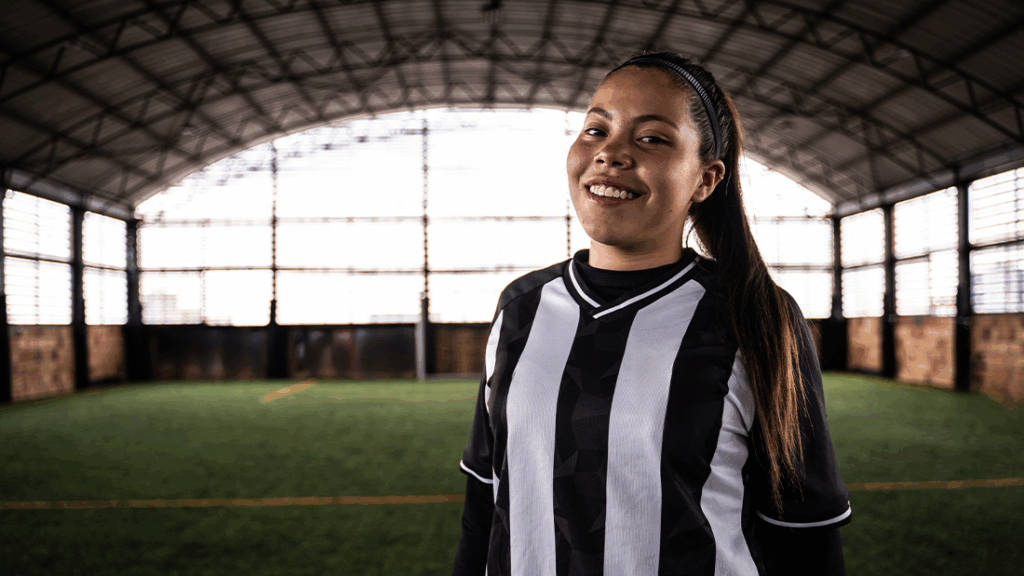Safeguarding Minors in All Roles, Including Officials
Prevention Education Series
The goal of this series is to bridge the gap between prevention education theory with on-the-ground practice.

Last weekend, my 10-year-old had a flag football game. It was the fifth time this season his team lost by more than 20 points. The team made the same mistakes they’ve made all season—dropped passes, missed flags, confused plays. Just like in previous games, I overheard his coach reminding the team that the point of this stage of football is to learn and grow. “It’s not about the scoreboard. It’s about learning the game and getting better.”
Over the course of my son’s young athletic career, he has played on multiple soccer, basketball, and flag football teams. Every season in every sport, the coaches are exceptional at helping young players recognize the importance of making mistakes as part of the learning process. And yet, I have noticed that this same philosophy rarely extends to the minors officiating games. This past weekend I witnessed my son’s coach yell across the field at a minor official who missed a call. In the car ride home, my son said, “We lost the game because that official was terrible.”
My son has clearly internalized the value of patience when it comes to himself and his teammates. For him, their fumbles and missteps are no big deal. “They’re still learning,” he will often say. But when it comes to the minor official who was clearly a teenager, one mistake became the main headline of the game.
My son is not alone in this tendency to place blame. Officials at every level of sport often become the outlet for our frustrations when a game doesn’t go as we hoped. That’s not just unfair; it’s a cultural contradiction that puts minor officials at risk of abuse.
The point of this email series is to help disentangle the value of abuse prevention from the behaviors that ultimately stop abuse. I think most of us already know that abuse is bad and that bullying a minor official is not good sportsmanship. Yet it happens—week after week, season after season—in nearly every sport.
We must dig deeper and look more meaningfully at several issues. What is the impact of abuse and harassment on the volume of officials in sport? How does being an official bring additional risks of abuse for minors? How are the experiences of minor officials different from the experiences of minor athletes? And finally, how can we change the culture so that officiating becomes one of the many safe growth opportunities for minors in sport?
The Shortage:
Why Are We Losing Officials?
We often hear from sport organizations that they struggle to recruit and retain officials. This has been a growing problem in the last 20 years for several reasons. First, officials are an aging demographic. In a 2023 survey, the average age of an official was 57 (2023 National Officiating Survey). Many officials also never returned after the pandemic delayed or shut down entire seasons in 2020 and 2021(The Sport Journal). With so many officials nearing retirement, the next generation needs to be prepped to take their place.
But one of the most common reasons we hear from NGBs for the shortage is the growing concern of abuse and harassment aimed at officials. In that same 2023 survey, 51% of both male and female respondents felt unsafe or feared for their safety because of administrator, coach, player, or spectator behavior. And 50% said sportsmanship was the worst at the youth competitive level (2023 National Officiating Survey).
The Risk Factors:
Why Are Minors at Greater Risk?
While officials of all ages often face some level of abuse and harassment, there are several factors that put minor officials at even greater risk.
- They are targeted by all sides: Minor officials are targeted by multiple people in various roles, including those who have a level of power over them. Coaches and other adults can get aggressive when challenging calls. Players, who are the officials’ peers, and spectators can taunt and harass them. It’s a lot of pressure—and a lot of personalities and power differences—for a young person to handle.
- They don’t get the same support as athletes: Minor athletes have an entire team, coaching staff, and spectators on the sidelines cheering them on. Minor officials, however, are often the only one on the field in their role. They lack structured systems for learning and growth and are officiating games that are coached by adults. This isolation makes them more vulnerable to bullying and harassment—and less likely to have immediate support when abuse occurs. If an adult coach starts yelling at a minor referee, it is often up to a parent on the sidelines to intervene.
- They are often overlooked when implementing prevention policies: Within the U.S. Olympic and Paralympic Movement (“the Movement”), minor officials fall under the Minor Athlete Abuse Prevention Policies (MAAPP). It’s a set of policies aimed at reducing the risks of abuse of minors in the Movement. But many organizations fail to protect minor officials in the same ways they do athletes. For example, minors and adults should not be changing clothes in the same space. But minor and adult officials often share the same locker room. Adults should not be sending electronic messages (texts, emails, etc.) to minors. But minor and adult officials may be coordinating schedules, transportation, and other details without a parent or guardian copied.
The Double Standard:
Aren't Minor Officials Learning, Too?
Officials at every level often become an outlet for our frustration over losses. We would be outraged as parents if the coach told the team, “We lost this game because Jimmy dropped 5 passes and missed 4 flag pulls.” What we don’t always notice are the subtle ways we hold young officials to higher standards than we do with our own kids. It’s common to see adults placing blame on the missed calls of a minor official. We overlook their inexperience, their learning curve, and their need for support, all while preaching patience and progress to the athletes on the field.
In contrast, we do not expect minor athletes to perform like adult elite athletes. We know that it takes years of training to be an elite athlete who is a master at their sport. So why do we expect minor officials to demonstrate nearly perfect officiating?
There is often a lack of infrastructure to help minor officials grow into their roles. At the elite level, officiating is not a casual side role. It’s a serious, structured profession. Officials in professional and high-performance leagues often attend formal training programs, workshops, and seminars to stay sharp and consistent.
For example, NHL officials and FIFA referees have access to training sessions, professional development programs, and mentorship opportunities. They improve with fitness testing, post-match analysis, and technical evaluations. These systems recognize that good officiating requires just as much learning, feedback, and growth as athletic performance.
In contrast, minor officials at the grassroots level rarely receive this kind of structured development. They are often thrown in with little training. Meanwhile, young athletes in these same grassroots leagues are encouraged to grow, not just in skill, but in confidence, teamwork, and love for the sport. Coaches and clubs invest time and care into developing them.
The mission of youth sport is not just competition. It’s about creating lifelong participants in sport and physical activity. If we truly believe sport is a space for learning, then we need to treat young officials as learners too, with access to safe mentorship and protection from abuse. This is not just about fairness. It’s about building a stronger sport culture from the ground up.
The Solution:
How Do We Create Real Change?
Lack of training and the fear of harassment impacts the ecosystem of sport by driving away a key role. After all, games and competitions can’t go on without officials. It’s clear sport communities need to work together to end harassment toward officials and solve the shortage. But we can’t just agree that “harassment is bad” and expect that to solve the problem.
Saying “end abuse” isn’t enough. We have to dig deeper and examine what values and beliefs inform our behaviors. If “end abuse” was enough of a motivator, then we wouldn’t see minor officials being harassed as frequently as they are, and sports programs wouldn’t have such difficulty recruiting and retaining officials.
We should be positioning minor officials as an extension of our teams. And, especially at the grassroots level, we need to shift our mindset to allow them the space to make mistakes and learn.
This isn’t to say that we should celebrate when a missed call seriously affects the outcome of a game. But what I am calling on us to do is to really examine the difference between how we view the mistakes of minor athletes as opposed to the mistakes of officials. And in turn, examine how those beliefs influence our behaviors towards both groups.
Safeguarding for All
Safeguarding in sport should extend to everyone, but particularly to minors in all roles. And while it is the responsibility of organizations to ensure they have effective abuse prevention policies, it is up to all of us in the ecosystem to be mindful of how we may be unintentionally contributing to a culture where abuse can thrive.
We need to become weekend sport sociologists by paying attention to the way coaches, parents, and players talk about and to officials. We need to ask ourselves: Do I expect more from that teen referee than I do from my own child’s teammates? Let’s honestly examine that gap between the grace we offer our kids and the pressure we put on young officials.
Understanding how that gap influences the behavior we deem acceptable or unacceptable is where I believe change can come.

Monica Rivera
Vice President, Education & Research, U.S. Center for SafeSport
Monica has spent nearly two decades in the field of interpersonal violence prevention, much of that time working directly with survivors of abuse. She leads our team of subject matter experts who share a belief in the transformative power of prevention education.
Please email our education team with questions or feedback about the content of our online courses, resources, or live trainings: [email protected].
Featured Resource
Officials have a unique role in sport—they are ideally positioned to notice inappropriate behaviors during games and competitions, but they are often the target of verbal and physical abuse themselves. Share this quick reference guide so they can better protect themselves and others.
JOIN OUR EMAIL LIST
Stay connected with the latest news, resources, and tools. Enjoy our quarterly e-newsletter, The Gameplan.
